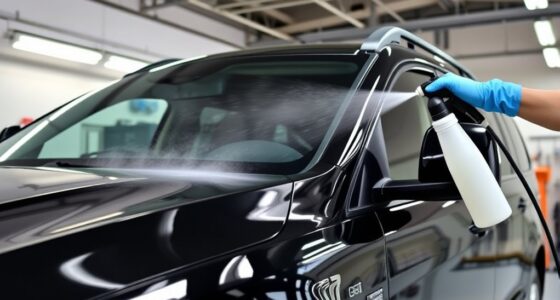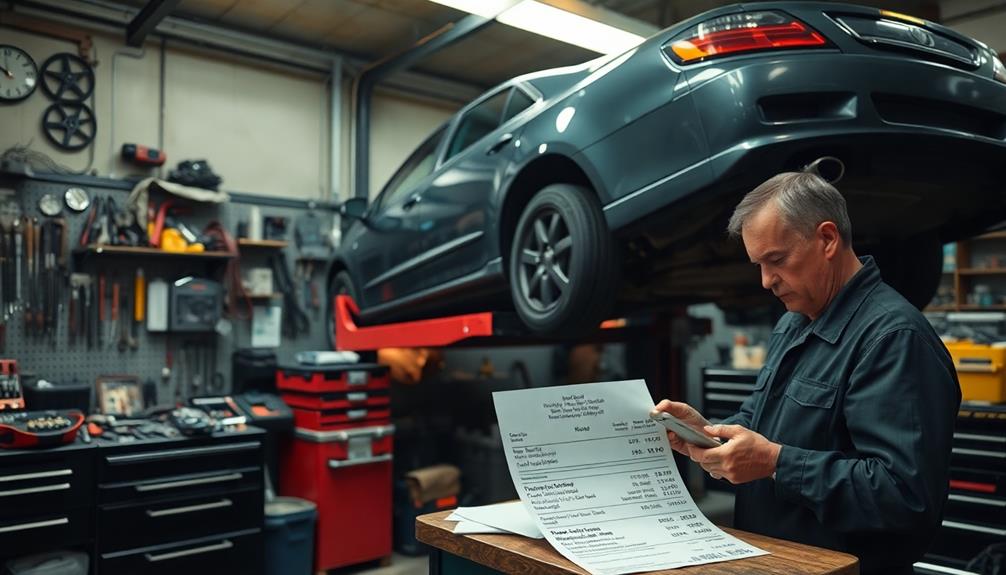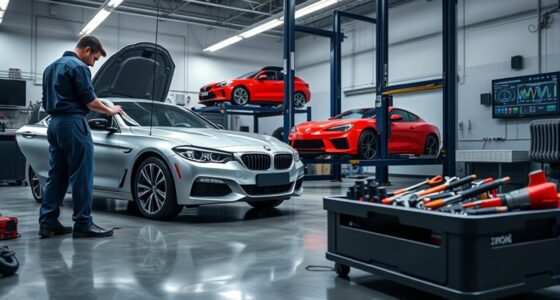To start an automotive repair shop, you'll need a well-crafted business plan that outlines your services and startup costs. Secure the necessary licenses and permits to comply with local regulations. Funding is vital, so consider options like small business loans or personal savings. Invest in essential tools and equipment, such as diagnostic machines and vehicle lifts. You'll also want to develop marketing strategies to attract customers, including a professional website and community engagement. Finally, hiring skilled staff is essential for success. Stay tuned to discover more about each step and how to set yourself apart in this competitive field.
Key Takeaways
- Develop a comprehensive business plan outlining service offerings, startup costs, and financial projections to attract funding and guide operations.
- Secure necessary licenses and permits, including a specialized vehicle repair business license and any required environmental permits.
- Choose a strategic location with high visibility and easy access to attract more customers and boost foot traffic.
- Invest in essential tools and equipment like hand tools, vehicle lifts, and diagnostic machines necessary for effective operations.
- Implement effective marketing strategies, including a professional website, community engagement, and promotional offers to attract and retain customers.
Create a Business Plan

When starting an automotive repair shop, creating a solid business plan is vital for your success. Your plan should define your service offerings, deciding whether you'll specialize in certain areas or provide general repairs. This choice will help you attract different customer segments. Additionally, it’s essential to consider the equipment and tools you’ll need to perform these services, including specialized machinery for diagnostics or welding. Understanding various **welding methods for auto repair** can also be crucial, as these are often required for tasks like frame repairs, exhaust fixes, or bodywork. By mastering these techniques, you can offer a higher quality of service, setting your shop apart from competitors.
Next, choose a strategic location that guarantees high visibility and easy access to your target market. This can greatly boost customer foot traffic and overall success.
You'll also need to estimate your startup costs, which typically range from $50,000 to over $100,000 for a fully equipped workshop.
To develop a thorough business plan, analyze local competitors to understand market dynamics, customer preferences, and pricing strategies.
Your financial projections must include administrative costs, employee salaries, and marketing expenses. This detailed approach will help you manage resources effectively, making sure you're prepared for the financial demands of running your shop.
Legal Requirements and Licenses

Before you open your automotive repair shop, you need to secure the necessary business licenses and pass a criminal background check.
Compliance with local zoning regulations and being ready for inspections are essential to guarantee your operation runs smoothly.
Let's explore what you need to do to meet these legal requirements.
Required Business Licenses
Starting an automotive repair shop requires maneuvering a variety of legal requirements and licenses to guarantee smooth operations.
First and foremost, you'll need a specialized vehicle repair business license, which comes with an application fee of about $569.59 and an annual renewal fee of $546.34. It's essential to understand that a criminal background check is mandatory for all applicants, and any discrepancies can delay your licensing process.
Once you obtain your business license, you must display it prominently on your premises, as unannounced inspections may occur to verify compliance with licensing regulations.
Additionally, you might need a Sales Tax Permit to collect sales tax on parts and services, as well as an Environmental Permit to adhere to local environmental guidelines.
Timely renewal of your license is important; failing to renew within 30 days of expiration means you'll have to reapply as a new applicant, jeopardizing your operational continuity.
Stay organized and vigilant about these requirements to keep your automotive repair shop running smoothly and legally.
Background Check Process
The background check process is a critical step in securing a mechanic shop license, and it directly influences your application outcome. Here are a few key points to take into account:
- A criminal background check is mandatory for all applicants.
- The initial license fee for your mechanic shop is $569.59.
- You'll pay an annual renewal fee of $546.34 to keep your license active.
- You must display your permit on the premises at all times.
When applying for your mechanic shop license, you can submit your application in person or by mail. Be prepared to provide necessary documents, such as the Certificate of Occupancy and Articles of Incorporation if applicable.
Renewal invoices for your license will arrive 30 to 45 days before expiration, so keep an eye on those dates. If you fail to renew within 30 days after expiration, you'll need to reapply as a new applicant.
Additionally, be aware that unannounced inspections can occur to verify compliance with licensing regulations. Understanding this background check process will help streamline your application process and set a solid foundation for your automotive repair shop.
Compliance and Inspections
Operating an automotive repair shop requires strict adherence to legal requirements and licenses to ascertain compliance and smooth business operations. You'll need to obtain a specialized vehicle repair business license, which comes with an initial fee of $569.59 and an annual renewal fee of $546.34. A criminal background check is mandatory for all applicants and for license renewals, impacting the approval process.
Additionally, compliance with local zoning regulations is vital. Confirm your location is permitted for commercial use as an automotive repair facility. Be prepared for unannounced inspections, which enforce compliance with licensing regulations. Your permit must be prominently displayed on the premises at all times.
Failure to renew your license within 30 days of expiration necessitates re-application as a new applicant, potentially incurring additional fees and background checks.
| Requirement | Details | Fees |
|---|---|---|
| Business License | Initial Fee | $569.59 |
| Renewal Fee | Annual License Renewal | $546.34 |
| Criminal Background Check | Mandatory for License & Renewal | Varies |
| Local Zoning Compliance | Must permit commercial use | N/A |
| Inspections | Unannounced inspections | N/A |
Financing Your Shop

When launching your automotive repair shop, securing adequate financing is essential to cover initial costs, which can easily exceed $50,000 and often surpass $100,000 based on location and equipment needs.
To navigate this financial landscape, consider these key steps:
- Create a solid business plan – This will help you estimate startup costs and is pivotal for convincing lenders or investors.
- Explore small business loans – Look into SBA loans, particularly SBA 7(a) and SBA 504, which offer favorable terms for equipment and property purchases.
- Utilize personal savings – Tapping into your savings can provide a financial cushion and demonstrate your commitment to potential lenders.
- Research various financial sources – Don't limit yourself to just bank loans; negotiate with equipment suppliers for payment terms that fit your budget.
Additionally, establishing a business bank account and building a credit history with a business credit card can facilitate easier access to future financing opportunities.
Setting Up Operations

Securing financing sets the stage, but getting your operations up and running is where the real work begins. Start by establishing a dedicated business bank account to keep your personal finances separate. This not only helps with tracking but also builds your credit history for future financing opportunities.
Next, obtain the necessary licenses and permits, including a specialized vehicle repair business license, which typically requires an initial fee of $569.59 and annual inspections.
Invest in essential tools and equipment like hand tools, vehicle lifts, and diagnostic machines. Remember, startup costs for a car workshop can average over $100,000, so budget wisely.
Additionally, develop a thorough shop handbook that outlines policies, procedures, and customer service guidelines. This guarantees consistent operations and effective staff training.
Don't forget to secure insurance to protect your business and assets.
Marketing Your Services

When it comes to marketing your automotive repair shop, you can't overlook the power of digital strategies and community engagement.
Hosting events and offering promotional discounts can attract new customers while building a loyal client base.
Digital Marketing Strategies
Digital marketing strategies are essential for promoting your automotive repair shop and attracting new customers. Here are four key tactics to take into account:
- Establish a Professional Website: Your website should include service descriptions, pricing, and customer testimonials. Remember, 75% of consumers judge credibility based on website design and information.
- Utilize SEO Techniques: Improve your online visibility by targeting local keywords like "auto repair near me." This helps you attract local customers effectively.
- Leverage Social Media Platforms: Engage with customers on channels where 54% of users research products. Share promotions and showcase successful repairs or customer stories to build trust.
- Implement Targeted Online Advertising: Use Google Ads or Facebook Ads for targeted online advertising. When executed properly, these campaigns can yield a 200% ROI, reaching potential customers in your area.
Additionally, think about creating a referral program to incentivize existing customers.
Word-of-mouth marketing can lead to a 5-10% increase in customer acquisition, enhancing your shop's growth.
Community Engagement Events
Engaging with your community can greatly enhance your automotive repair shop's visibility and reputation. Organizing community engagement events, like free vehicle safety inspections or workshops on basic car maintenance, establishes your shop as a trusted resource. You can also sponsor local sports teams or charity events to boost brand visibility and foster goodwill.
Here's how you can structure your community engagement efforts:
| Event Type | Purpose | Benefits |
|---|---|---|
| Grand Opening Event | Generate buzz | Attract new customers with promotional discounts |
| Vehicle Safety Inspections | Educate and provide value | Build trust and showcase expertise |
| Customer Appreciation Days | Strengthen relationships | Encourage loyalty and repeat business |
| Cross-Promotional Events | Partner with local businesses | Expand reach and introduce services |
Promoting these events on social media platforms can further enhance your shop's online presence and encourage participation. By connecting with the community through these initiatives, you'll not only increase foot traffic but also create a loyal customer base that values your contributions.
Promotional Offers and Discounts
Utilizing promotional offers and discounts is a powerful way to attract new customers and retain existing ones at your automotive repair shop. Here are some effective strategies to take into account:
- Grand Opening Event: Kick off with promotional discounts, like 20% off services for the first month, to attract initial customers and generate community buzz.
- Referral Program: Implement a referral program that rewards existing clients with discounts or free services for bringing in new customers, enhancing word-of-mouth marketing.
- Seasonal Promotions: Offer discounted services, such as tire rotations or oil changes during specific months, to drive retail traffic during slower periods.
- Loyalty Programs: Create loyalty programs that provide a free service after a set number of visits, encouraging repeat business and customer retention.
Don't forget to leverage social media to announce flash sales or limited-time offers. This creates urgency, prompting customers to act quickly.
Hiring and Training Staff

When you're starting an automotive repair shop, hiring and training the right staff is fundamental for your success. You'll need a mix of experienced mechanics, apprentices, and administrative personnel to handle your anticipated service volume efficiently.
Focus on hiring candidates with relevant certifications, particularly ASE certification, as this boosts your shop's credibility and guarantees your mechanics have the necessary technical skills.
Offering competitive salaries and benefits is essential, especially since skilled mechanics typically earn between $40,000 to over $70,000 annually, depending on their experience and specialization. This not only attracts top talent but also promotes employee satisfaction, which is critical for retaining skilled staff.
Implement extensive training programs that keep your team updated on the latest automotive technologies and customer service practices. This fosters continuous development and helps maintain high standards in your shop.
Finally, establish a positive work environment that encourages teamwork and open communication. Studies show that a supportive atmosphere directly correlates with improved employee satisfaction, ultimately leading to enhanced customer service and better business performance.
Investing in your staff is investing in your shop's future.
Frequently Asked Questions
What Permits Do I Need to Open a Mechanic Shop in Texas?
To open a mechanic shop in Texas, you'll need a specialized vehicle repair business license and a Certificate of Occupancy. Make certain you comply with environmental regulations and display all required permits on your premises.
What Is the Profit Margin for Auto Repair Shops?
While many businesses struggle to break even, auto repair shops often enjoy profit margins between 10% and 20%. If you manage labor costs and parts effectively, you can boost that margin considerably.
What Are the New Auto Repair Laws in Texas?
In Texas, you need a specialized vehicle repair business license, pay initial and renewal fees, undergo a background check, comply with environmental regulations, and display your permit prominently to stay compliant with new auto repair laws.
How to Start an Automotive Business?
To start your automotive business, you'll need a solid business plan, secure financing, obtain necessary licenses, and create a marketing strategy. Also, consider forming a legal entity to protect your personal assets.
Conclusion
Starting an automotive repair shop might seem intimidating, but with the right preparation, you can turn your passion into profit. Many believe that success is all about location, but it's really about how well you understand your customers' needs and deliver exceptional service. By following the steps outlined—crafting a solid business plan, ensuring you're legally compliant, and marketing effectively—you'll be well on your way to building a thriving shop that keeps customers coming back.









